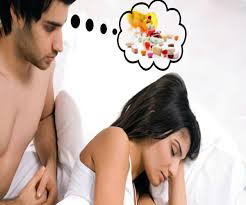Sexual dysfunction refers to a problem or difficulty that occurs during any phase of the sexual response cycle, which includes desire, arousal, plateau, orgasm, and resolution. Sexual dysfunctions can occur in both men and women and can have a significant impact on an individual’s sexual and emotional well-being.
Some common sexual dysfunctions in men include erectile dysfunction (ED), premature ejaculation (PE), delayed ejaculation, and low libido. ED is the inability to get or maintain an erection sufficient for sexual intercourse, while PE is the inability to control or delay ejaculation. Delayed ejaculation is the inability to ejaculate during sexual activity, and low libido refers to a decreased desire for sexual activity.
In women, common sexual dysfunctions include female sexual arousal disorder (FSAD), female orgasmic disorder (FOD), and hypoactive sexual desire disorder (HSDD). FSAD refers to the inability to become physically aroused during sexual activity, while FOD is the difficulty in achieving orgasm. HSDD refers to a decreased desire for sexual activity.
Sexual dysfunctions can have physical, psychological, or relational causes. Some common physical causes include hormonal imbalances, medication side effects, and medical conditions such as diabetes or cardiovascular disease. Psychological causes may include anxiety, depression, stress, or relationship issues. Treatment for sexual dysfunctions may involve addressing underlying medical or psychological conditions, counseling, medication, or other therapies.
Symptoms
The symptoms of sexual dysfunction can vary depending on the specific type of dysfunction and the individual affected. Some common symptoms include:
For men:
Difficulty achieving or maintaining an erection (ED)
Premature ejaculation (PE)
Delayed ejaculation (DE)
Reduced sexual desire or libido
Inability to achieve orgasm
For women:
Difficulty becoming sexually aroused (female sexual arousal disorder or FSAD)
Difficulty achieving orgasm (female orgasmic disorder or FOD)
Reduced sexual desire or libido (hypoactive sexual desire disorder or HSDD)
Other symptoms that may be associated with sexual dysfunction include anxiety or stress related to sexual activity, feelings of guilt or inadequacy, and decreased self-esteem or self-confidence. Sexual dysfunction can also impact an individual’s relationship with their partner, leading to feelings of frustration or resentment.
It’s important to note that occasional difficulty with sexual function is normal and may not necessarily indicate a sexual dysfunction.
However, if symptoms persist or cause significant distress, it’s recommended to speak with a healthcare provider for an evaluation and potential treatment options.
Type
There are several types of sexual dysfunctions that can affect both men and women. These include:
For men:
Erectile Dysfunction (ED): The inability to achieve or maintain an erection sufficient for sexual activity.
Premature Ejaculation (PE): Ejaculating too quickly during sexual activity, often before desired.
Delayed Ejaculation (DE): Difficulty or inability to ejaculate during sexual activity, even with sufficient stimulation.
Low Libido: A reduced or lack of desire for sexual activity.
For women:
Female Sexual Arousal Disorder (FSAD): Difficulty in becoming sexually aroused or maintaining arousal during sexual activity.
Female Orgasmic Disorder (FOD): Difficulty in achieving orgasm or an absence of orgasm, even with sufficient stimulation.
Hypoactive Sexual Desire Disorder (HSDD): A lack of interest or reduced desire for sexual activity.
Sexual dysfunctions can have physical, psychological, or relational causes, and may require different types of treatment depending on the underlying cause. It’s important to speak with a healthcare provider if you’re experiencing persistent or distressing symptoms of sexual dysfunction.
Diagnosis
The diagnosis of sexual dysfunction typically involves a thorough medical and sexual history, physical examination, and possibly laboratory testing. Your healthcare provider may also ask about any medications you’re currently taking, as some medications can cause sexual side effects.
During the physical exam, your healthcare provider may check for any physical abnormalities that may be contributing to your sexual dysfunction, such as a hormonal imbalance, neurological disorder, or circulatory problems.
In some cases, your healthcare provider may also recommend specialized testing, such as a nocturnal penile tumescence (NPT) test for men with erectile dysfunction, or a pelvic exam for women with sexual dysfunction.
Psychological evaluations may also be used to diagnose sexual dysfunction, particularly if there is evidence of anxiety, depression, or other mental health concerns.
Ultimately, the diagnosis of sexual dysfunction will depend on the specific symptoms and underlying causes, and may involve collaboration between different healthcare providers, such as urologists, gynecologists, endocrinologists, or mental health professionals.
Treatment
The treatment for sexual dysfunction depends on the specific type of dysfunction and underlying causes. In some cases, treatment may involve addressing physical or medical issues, such as treating an underlying medical condition or adjusting medications that may be contributing to the dysfunction. Other times, psychological counseling or therapy may be recommended to address issues such as anxiety, depression, or relationship problems.
Some common treatment options for sexual dysfunction include:
For men:
Medications such as sildenafil (Viagra), tadalafil (Cialis), or vardenafil (Levitra) to improve erectile function
Behavioral techniques such as the squeeze technique or stop-start technique to help with premature ejaculation
Testosterone replacement therapy for men with low testosterone levels
Psychotherapy or counseling to address underlying psychological issues
For women:
Medications such as topical creams or low-dose estrogen therapy for vaginal dryness or pain during intercourse
Behavioral techniques such as mindfulness or cognitive-behavioral therapy to address psychological factors contributing to sexual dysfunction
Sex therapy to help with sexual difficulties and enhance sexual pleasure
Treatment of underlying medical conditions or medication adjustments that may be contributing to sexual dysfunction
It’s important to note that treatment for sexual dysfunction is highly individualized, and may involve a combination of approaches depending on the underlying causes and individual needs. Working closely with a healthcare provider or specialist in sexual medicine can help determine the most effective treatment plan.
Conclusion
Sexual dysfunction can be a complex and distressing issue that can affect both men and women. It’s important to understand that occasional difficulty with sexual function is normal and may not necessarily indicate a sexual dysfunction. However, if symptoms persist or cause significant distress, it’s recommended to speak with a healthcare provider for an evaluation and potential treatment options.
The diagnosis of sexual dysfunction typically involves a thorough medical and sexual history, physical examination, and possibly laboratory testing. Treatment for sexual dysfunction may involve addressing physical or medical issues, psychological counseling or therapy, and/or medication.
It’s important to work closely with a healthcare provider or specialist in sexual medicine to determine the most effective treatment plan for you. With the right treatment, many people with sexual dysfunction are able to improve their sexual function and enhance their sexual pleasure and satisfaction.




































.jpg)




No comments:
Post a Comment